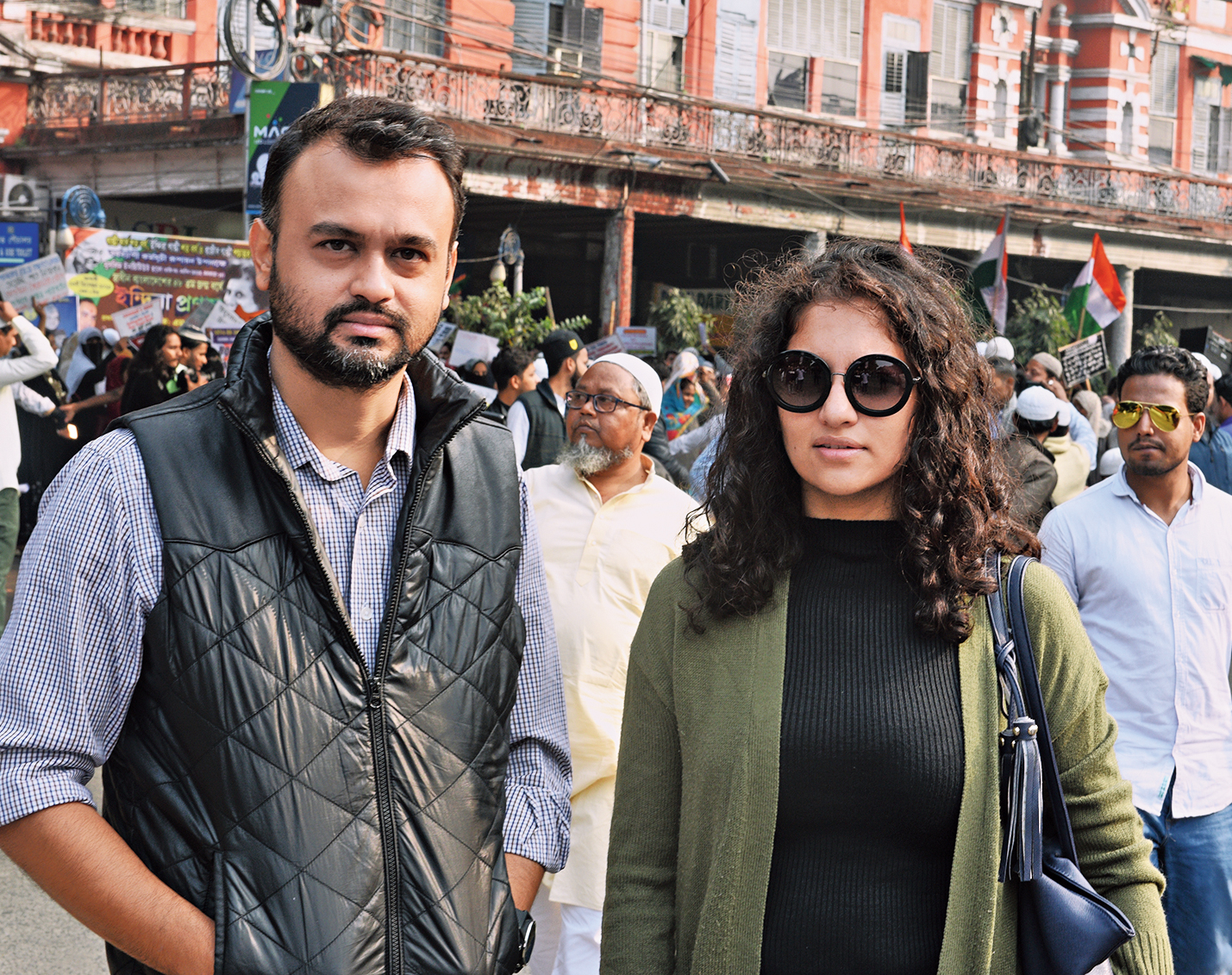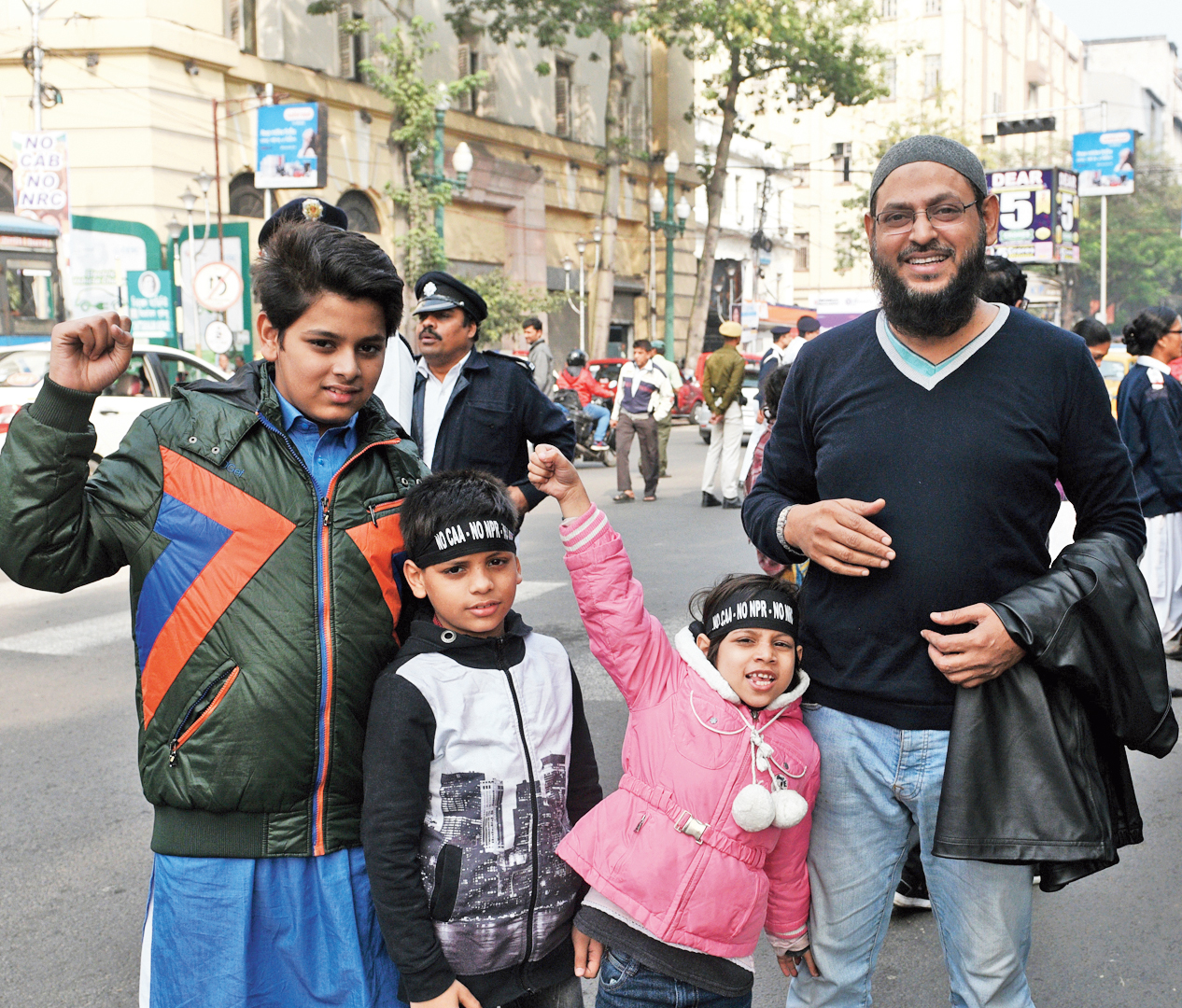Thousands marched through the heart of Calcutta on Friday, not for themselves but for their neighbours — fellow citizens who feel threatened by the new citizenship matrix.
They walked for people who practise a different faith, eat different food and wear different clothes but are bound by the common thread of being Indian.
Among them were Harsh Khemka and Gunjan Chandak Khemka, a couple from Mayfair Road in Ballygunge.
“We are here because the CAA-NRC-NPR combine has discrimination at its root. It is a ploy by the government to deflect attention from the real issues like unemployment and the economy (which is sputtering),” said Gunjan, a psychologist.
Harsh, who’s in the tea business, felt “proud as a Calcuttan to see so many people on the streets to protest divisive policies”. Friday was a working day for both of them. It did not matter.
They walked the full course from Statesman House to the Gandhi statue on Mayo Road.
Walking a few metres away was Shukla Sanyal, a 61-year-old former professor of history at Calcutta University and Presidency University. Not too far away was Bishop’s College principal Sunil Caleb.
Along with them walked many Muslims. One of them was Muzaffar Ali, a businessman from Beniapukur.
“Thank you, Narendra Modi. Thank you, Amit Shah,” Ali said. “Without their schemes, I would not have known that so many Hindu brothers and sisters are ready to fight for us.”
Aysha Renna, the Jamia Millia student who had saved a friend from the police’s batons, spoke at the rally. She began with Mamata Banerjee’s Bengali slogan: “Aamra kara? Nagarik (Who are we? Citizens)!” The audience applauded with vigour.

Harsh Khemka and Gunjan Chandak Khemka, a couple from Mayfair Road in Ballygunge, walked on Friday with thousands of others “to protest the divisive policies” of the government. Picture by Pradip Sanyal
Later, in Zakaria Street, she was joined by Debsmita Chowdhury, the Jadavpur University gold medallist who had torn up a copy of the Citizenship (Amendment) bill at her annual convocation.
At the rally at the city centre, history professor Shukla, who had come from Salt Lake with husband Palash Baran Pal, emeritus professor of physics at Calcutta University, said: “When our children were growing up, they did not distinguish between Hindu and Muslim friends. But children now are being made to realise the divide, even in schools.”
Right fist raised, Pal, 64, lent his voice to the chorused slogans as he walked with a young and boisterous group. “The BJP got less than 40 per cent of the votes in the 2019 Lok Sabha polls. That means 60 per cent of the voters are still against them. The battle is far from over,” he said.
Walking together were two septuagenarians — Madhuchhanda Karlekar, who runs an NGO, and Sudha Kaul, founder of the Indian Institute of Cerebral Palsy.
Karlekar has lived the “nightmare” of the 1947 riots. “A repeat must be stopped at any cost,” she said.
She explained why she felt Indian Muslims should not be asked to prove their citizenship. “During Partition, their forefathers had chosen secular India over Islamic Pakistan. By choosing India, they had already proven their loyalty.”
The presence of so many non-Muslims was a beacon of hope for some, such as social activist Harsh Mander, one of the leaders of the march organised by the Forum for Democracy and Communal Amity.
On Thursday, he had said the mass protests by non-Muslims against the CAA-NRC-NPR distinguished contemporary India from Hitler’s Germany and offered hope that the country would not turn into a fascist majoritarian state.
“Gated citizenship to Jews, and a state crackdown on Left and liberal universities were there in Germany too. But there was no large-scale protest with the involvement of non-Jew, ordinary citizens. There was no federal pushback, either. Both factors are in full play in India,” Mander had said.
On Friday, Mander spoke along with a host of others after the rally ended at the Gandhi statue on Mayo Road. “He (Gandhi) fought the same battle 100 years ago. You are living his dream of Hindu-Muslim unity,” he told the crowd to loud cheers.
Santosh Rao and Mohammad Shamir, neighbours from Howrah’s Shibpur, had come together with a poster. “We have grown up together on the same land and will continue to live here together, come what may,” said Rao, a trader.










